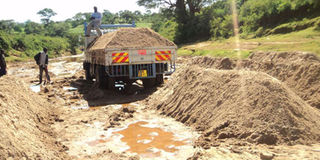With increased sand harvesting, we are now staring at a calamity

Sand harvesting at Isuuni River in Makueni County on January 10, 2014. As the construction industry booms, the demand for sand has soared. PHOTO | NATION MEDIA GROUP
What you need to know:
- A 2014 UN report says that globally, 40 billion tonnes of sand and gravel are extracted every year.
- Miners are required to obtain licences from Nema after an environmental impact assessment.
When I was growing up in the then Machakos District in the 1960s, we would fetch water for domestic use from rivers.
Even when the rains had long gone, we would scoop out water from shallow ponds (mivuko) in the sand on the riverbed.
The water that would percolate into those ponds would last the village until the next rainy season.
This was the case all over Ukambani. There was plenty of sand on river beds.
With the ballooning real estate sector, coupled with infrastructure projects, we are staring at a calamity.
This is because we are consuming sand much faster than nature can replenish it.
SAND EXTRACTION
As the construction industry booms, the demand for sand has soared.
With every skyscraper built in Nairobi, there is a river or two in Ukambani whose sand is being exhausted.
Unfortunately, the construction industry is heavily reliant on sand.
A 2014 UN report says that globally, 40 billion tonnes of sand and gravel are extracted every year.
The legal sand extraction industry is worth $70 billion (Sh7tn), roughly equivalent to Kenya’s GDP.
Sand is also used in the manufacture of microchips, detergents and other cleaning substances.
But the sector depleting most of our sand is the construction industry.
Building and expanding towns requires concrete and asphalt, both made from sand.
SAND SMUGGLING
Sand harvesting destroys riparian vegetation, affects the flow of water along the river, erodes the water holding capacity of the riverbed and damages ecosystems.
With the depletion of sand on river beds, harvesters target farmland.
The world is only slowly waking up to the fact that another finite resource is slipping through our fingers.
Singapore, for instance, has already run out of sand. In 2016, it imported 35 million tonnes.
Its neighbours have banned or restricted sand exports to Singapore over environmental concerns.
This has given rise to smuggling and a “sand mafia”.
The lucrative sand harvesting in Makueni has sparked bloody conflicts between cartels and locals besides deaths in collapsed mines.
LICENCES
Locals often take the law into their hands, torching trucks transporting sand from illegal sites.
Geoffrey Kasyoki, a policeman, was killed by a sand gang on February 11 last year for opposing illegal sand harvesting.
Considering the high level of poverty and erratic weather in the Ukambani counties of Machakos, Makueni and Kitui, sand harvesting is an easy way to earn quick money.
The National Environment Management Authority (Nema) drafted National Sand Harvesting Guidelines.
Miners are required to obtain licences from Nema after an environmental impact assessment.
Miners must demonstrate technical know-how. Harvesting should be done using an open-cast method, without underground extraction.
REGULATION
Scooping from riverbanks is prohibited to avoid widening rivers and it should only be done between 6am and 6pm.
The depth and appropriate areas are also stipulated. However, the degradation and illegal harvesting continues.
Makueni County has taken several measures to regulate sand mining.
We enacted the Makueni Sand Conservation and Utilisation Act of 2015, which established the Makueni County Sand and Utilisation Authority to regulate and ensure sustainable conservation and utilisation of sand, protecting the environment and equitable sharing of benefits.
CONSERVATION
The Ministry of Mining banned commercial harvesting of sand in Makueni, Isiolo, Kitui, Nairobi and Kajiado last December, and deployed inspectors to audit quarries and sand harvesting sites.
There has been laxity in enforcing the ban.
Communities must be sensitised on conservation, empowered on alternative sources of income and involved in policing for success to be realised.
Conserving sand will guarantee the provision of 80 per cent of the people’s water needs.
Reckless sand harvesting is a death sentence to us all.
Prof Kibwana is the Makueni Governor





